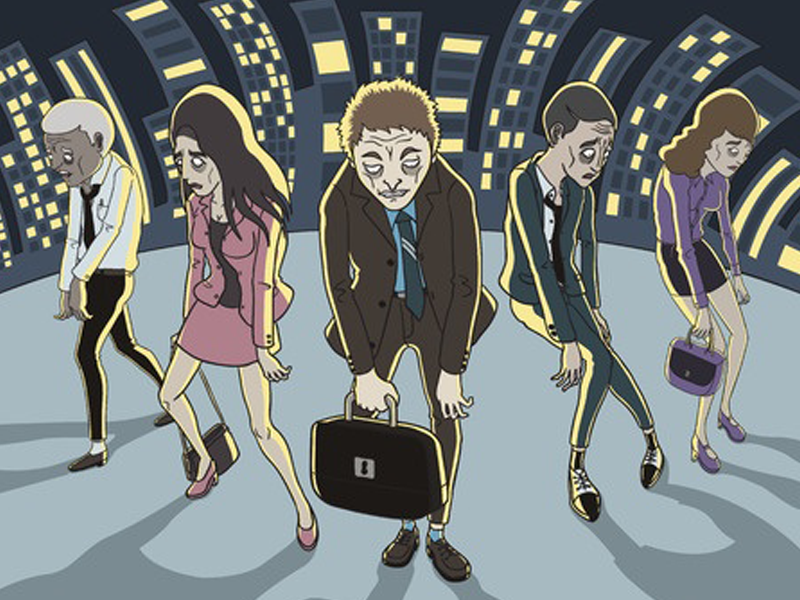
I like July. It’s a special month. Still enough time to plan summer trips. The days are long enough to enjoy evening walks. It’s the month that recognizes our great country’s independence.
With all the picnics, it’s no wonder it’s also National Hot Dog Month, National Grilling Month and even National Ice Cream month. For variety, it also celebrates National Ventriloquism Week and Sports Cliché Week (which I endorse 110%).
So, seeing what July held, I looked back a few months and discovered, in addition to Fathers’ Day, June also celebrated National Bathroom Reading Month (maybe not a coincidence with Fathers’ Day).
Checking a little further, I discovered that I really lost out in May. To my horror (so to speak), I missed celebrating Zombie Appreciation Month.
However, I also realized that, from a corporate standpoint, I may not have missed it at all. As a coach and consultant, I’ve seen many companies which seem to sustain and even appreciate the “Zombie” employee on an ongoing basis.
For those unfamiliar with the species, Zombies are creatures who have resurrected from the dead. They have no soul. They are mindless, led in a herd mentality, driven by the sense of self-preservation and dedicated to suck the life and souls from others so that they can join them as fellow Zombies. They live for the present, relying on what they have always done in the past.
In a benchmark Gallup study, the average workforce is characterized by three types of worker engagement: those actively engaged and passionate to move a company forward (about a quarter), those negatively engaged with a tendency to fight change and put down the company (about a fifth) and the remaining (roughly half) who tend to be neutral. According to Gallup, those neutrally engaged will tend to be pulled down by the negative employees more than empowered by the positive ones.
So, based on this perception, it is no wonder that so many companies are frustrated with lack of employee initiative, innovation, progress or customer passion. Apparently, Zombie employees do exist. The herd is moving, but without the soul for change. They don’t care about “what could be.” They simply care about self-preservation (and lunch).
A company’s culture and the leadership that sustains it are responsible for determining whether or not employees are susceptible to a Zombie mentality. The “Zombie Test” can be summarized by five questions:
- Does the company support or even encourage a culture of self-preservation and the status quo? These companies accept “good enough.” They look to eliminate conflict which might stimulate new thinking rather than embrace its opportunity. On the other hand, companies with “Zero-Zombie Tolerance” also have zero-tolerance for accepting the status quo.
- Does the company enable political nests that breed complacency? These environments reveal that there are perpetual idea-killers lurking in the company. New ideas are sucked dry by those who wield the greatest political clout.
- Do company surveys measure employee empowerment to change or, instead, encourage a herd mentality? If evaluations focus on the trivial (returns emails promptly, is courteous and tolerant) rather than what truly has impact (always puts the customer first, brings out better ideas in others, fosters progress and innovation), the company will simply “major on the minors” rather than enjoy radical progress.
- Are new employees required to “blend in” or are they encouraged to bring in new ideas? The average tenure for new executives tends to last under 18 months. Companies give lip service to change, but when confronted with new concepts, they are more likely to eliminate disruptions rather than embrace a culture of true diversity that includes new management styles or perceptions.
- Is there an overriding vision that the customer drives the success of the organization? When the customer’s current and anticipated needs are paramount above politics and complacency, Zombies are exposed. It becomes clear who is dedicated to the company’s success and who is dedicated to their own preservation and comfort. Zombie-proof companies are always pushing the envelope for the next level of success.
Zombies do exist (why else would we have a month recognizing them?). However, they do not have to influence the marketplace. Those companies driven by a vision to offer exceptional customer value above all else and encourage employee empowerment to fulfill the same send a message that there is a commitment to seek out and protect those employees with passion, initiative and a servant-leadership focus. They reward based on impact, not tenure. They have a distain for the “lukewarm.” They pursue, recognize, respect and reward those who reveal and sustain the “soul” of the company.
In his book, The Soul of the Firm, C. William Pollard, former CEO of ServiceMaster, writes, “The growth of the firm requires the continued interjection of the new.” Leadership that demands it will invigorate and preserve the soul of its employees as well.
And for that alone, most employees would give at least 110%.